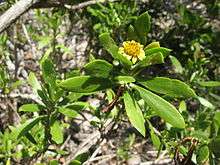Borrichia arborescens
| Borrichia arborescens | |
|---|---|
 | |
| Scientific classification | |
| Kingdom: | Plantae |
| (unranked): | Angiosperms |
| (unranked): | Eudicots |
| (unranked): | Asterids |
| Order: | Asterales |
| Family: | Asteraceae |
| Subfamily: | Asteroideae |
| Tribe: | Heliantheae |
| Genus: | Borrichia |
| Species: | B. arborescens |
| Binomial name | |
| Borrichia arborescens (L.) DC. | |
| Synonyms[1] | |
| |
Borrichia arborescens is a species of flowering plant in the composite family known by the common name tree seaside tansy. It is native to the Yucatán Peninsula, Cuba, Jamaica, Bahamas, Cayman Islands, Hispaniola, Puerto Rico, Bermuda, the Florida Keys, and other islands in the region. It is found on rocky and sandy coasts, in both beaches and marshes.[2][3][4][5][6][7]
Borrichia arborescens produces yellow flower heads in late spring and summer. Despite its common name, it is only a shrub reaching heights of 5 feet (150 cm).[8]
Hybrids with Borrichia frutescens are known where the two species come into contact.
References
- ↑ The Plant List Borrichia arborescens (L.) DC.
- ↑ Flora of North America, Borrichia arborescens
- ↑ Balick, M. J., M. H. Nee & D.E. Atha. 2000. Checklist of the vascular plants of Belize. Memoirs of The New York Botanical Garden 85: i–ix, 1–246
- ↑ Nash, D. L. 1976. Tribe V, Heliantheae. En: Nash, D.L. & Williams, L.O. (Eds), Flora of Guatemal a - Part XII. Fieldiana, Botany 24(12): 181–361, 503–570
- ↑ Sousa Sánchez, M. & E. F. Cabrera Cano. 1983. Flora de Quintana Roo. Listados Florísticos de México 2: 1–100
- ↑ Carnevali, G., J. L. Tapia-Muñoz, R. Duno de Stefano & I. M. Ramírez Morillo. 2010. Flora Ilustrada de la Peninsula Yucatán: Listado Florístico 1–326
- ↑ Semple, J. C. 1978. A revision of the genus Borrichia Adans. (Compositae). Annals of the Missouri Botanical Garden. 65: 681–693.
- ↑ The Institute for Regional Conservation- Natives for your Neighborhood
This article is issued from
Wikipedia.
The text is licensed under Creative Commons - Attribution - Sharealike.
Additional terms may apply for the media files.